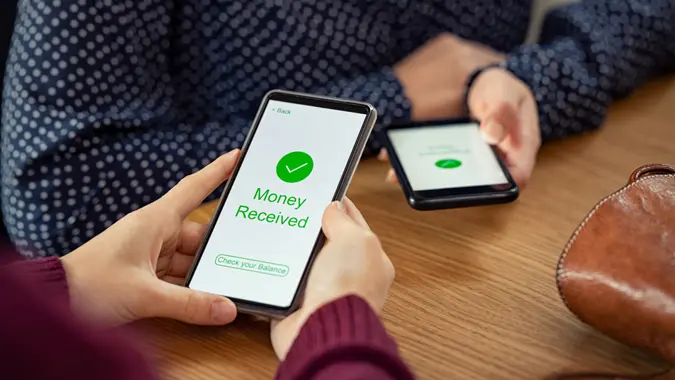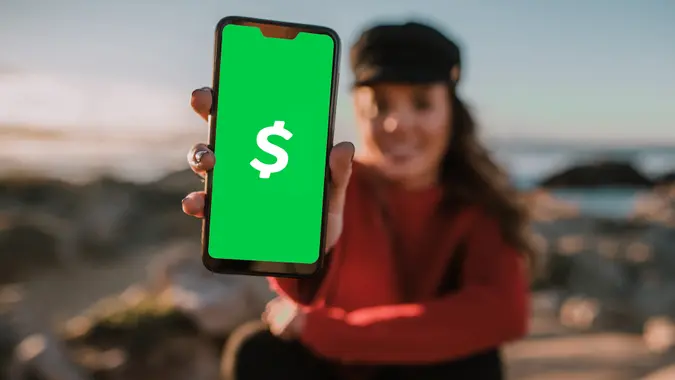6 Ways Millennials Can Protect Their Money From Fraud When Using Gig Services

Commitment to Our Readers
GOBankingRates' editorial team is committed to bringing you unbiased reviews and information. We use data-driven methodologies to evaluate financial products and services - our reviews and ratings are not influenced by advertisers. You can read more about our editorial guidelines and our products and services review methodology.

20 Years
Helping You Live Richer

Reviewed
by Experts

Trusted by
Millions of Readers
Using gig services like ride-sharing and food delivery have become the norm in this age of apps and ease. Unfortunately, millennials are bearing the brunt of fraud when it comes to them.
“Millennials are particularly vulnerable to fraud on gig platforms like ride-sharing and delivery services due to their high usage rates and the often-lax security measures associated with these apps,” said Dennis Shirshikov, head of growth at Summer and a finance professor at the City University of New York.
Some common tactics include phishing schemes, where fraudsters pose as customer service representatives or the platform itself to extract personal information or payment details.
“Another prevalent scam involves drivers or delivery personnel manipulating the system, such as by falsely claiming that a ride or delivery has been completed, leading to unauthorized charges,” Shirshikov added.
Additionally, scammers may use fake profiles or cloned apps to trick users into entering their payment information, which is then siphoned off for fraudulent purposes. With that in mind, here are several expert-backed ways to protect yourself from fraud on gig services.
Verify Authenticity of Communications
According to Shirshikov, it’s important to always verify the authenticity of any communication claiming to be from the gig service. “Phishing attacks often come in the form of urgent messages asking you to update payment information or log in to your account.”
He advised to never click on links in unsolicited emails or texts. Instead, go directly to the app or website to manage your account.
Use Strong, Unique Passwords and Enable Two-Factor Authentication (2FA)
“Ensure that your gig service accounts are protected by strong, unique passwords that are not used for other accounts,” said Shirshikov.
Additionally, you should enable two-factor authentication (2FA) wherever possible. This adds an extra layer of security by requiring a second form of verification, such as a code sent to your phone, before allowing access to your account.
Shirshikov said this simple step can significantly reduce the risk of unauthorized access, as even if a password is compromised, the attacker would still need the second verification method.
Monitor Your Accounts Regularly
Shirshikov warned to regularly check your bank statements and in-app transaction history for any unusual or unauthorized activity. “Early detection of fraud is crucial for minimizing financial damage.”
If you notice any charges you don’t recognize, report them immediately to both your bank and the gig service provider. He said, “For instance, a millennial who regularly monitors their accounts might quickly spot a fraudulent charge for a ride they never took, allowing them to dispute it and prevent further unauthorized transactions.”
Be Cautious With Payment Methods
Where possible, avoid linking your primary bank account or debit card directly to gig service apps. Instead, Shirshikov suggested using a credit card or a third-party payment service like PayPal, which often offers better fraud protection.
“Credit cards typically have more robust fraud protection policies and are quicker to reverse unauthorized charges than debit cards.” For example, he said using a credit card with strong fraud protection can provide an extra layer of security, allowing for a chargeback in the event of a scam.
Be Wary of Offers That Seem Too Good To Be True
Scammers often lure victims with offers that seem too good to pass up, such as heavily discounted rides or bonuses for using a service. “Always be skeptical of such offers, especially if they require you to enter additional personal or payment information,” Shirshikov advised.
Instead, stick to known, trusted promotions directly offered by the service through their official app or website.
Report Suspicious Activity
If you encounter any suspicious activity or believe you’ve been targeted by a scam, Shirshikov recommended you report it immediately to the gig service provider. “Most platforms have dedicated channels for reporting fraud, and timely reporting can help protect others from falling victim to the same scam.”
Additionally, he said to consider reporting the incident to your local consumer protection agency or the Federal Trade Commission (FTC).
 Written by
Written by  Edited by
Edited by 




























